人教朗文英语9年级上册同步全解
(人教+朗文)九年级英语同步辅导与练习:Unit17Themissingnecklace
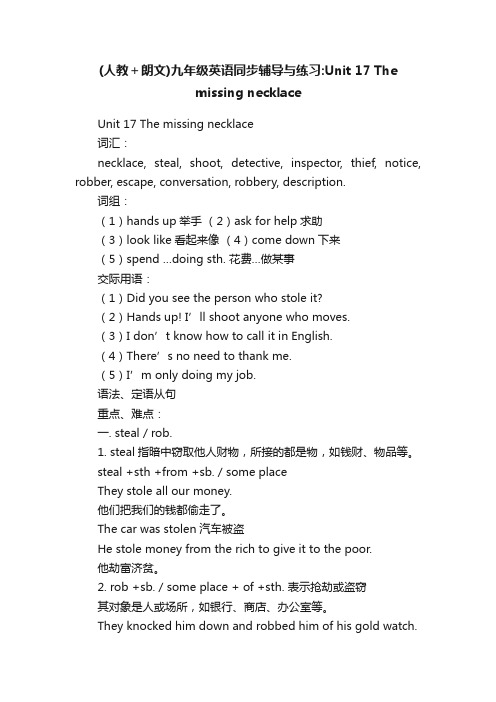
(人教+朗文)九年级英语同步辅导与练习:Unit 17 Themissing necklaceUnit 17 The missing necklace词汇:necklace, steal, shoot, detective, inspector, thief, notice, robber, escape, conversation, robbery, description.词组:(1)hands up举手(2)ask for help求助(3)look like看起来像(4)come down下来(5)spend …doing sth. 花费…做某事交际用语:(1)Did you see the person who stole it?(2)Hands up! I’ll shoot anyone who moves.(3)I don’t know how to call it in English.(4)There’s no ne ed to thank me.(5)I’m only doing my job.语法、定语从句重点、难点:一. steal / rob.1. steal指暗中窃取他人财物,所接的都是物,如钱财、物品等。
steal +sth +from +sb. / some placeThey stole all our money.他们把我们的钱都偷走了。
The car was stolen汽车被盗He stole money from the rich to give it to the poor.他劫富济贫。
2. rob +sb. / some place + of +sth. 表示抢劫或盗窃其对象是人或场所,如银行、商店、办公室等。
They knocked him down and robbed him of his gold watch.The car was robbed.车上的东西被盗了。
2023年(人教版+朗文)初三英语同步辅导(含同步练习)词语用法(Unit 7-12)
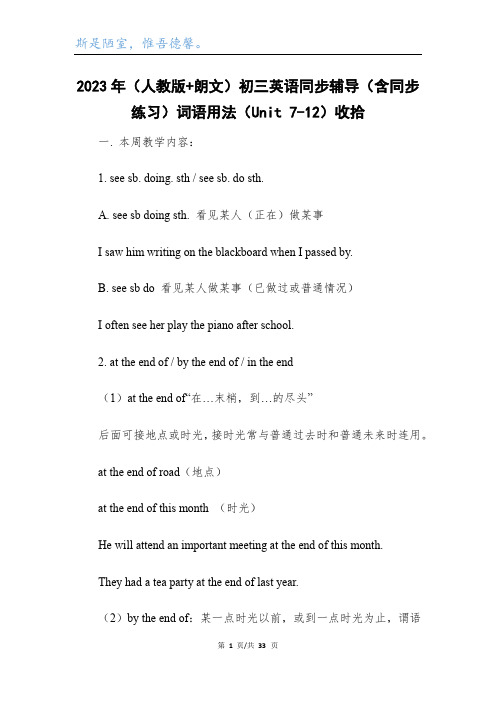
2023年(人教版+朗文)初三英语同步辅导(含同步练习)词语用法(Unit 7-12)收拾一. 本周教学内容:1. see sb. doing. sth / see sb. do sth.A. see sb doing sth. 看见某人(正在)做某事I saw him writing on the blackboard when I passed by.B. see sb do 看见某人做某事(已做过或普通情况)I often see her play the piano after school.2. at the end of / by the end of / in the end(1)at the end of“在…末梢,到…的尽头”后面可接地点或时光,接时光常与普通过去时和普通未来时连用。
at the end of road(地点)at the end of this month (时光)He will attend an important meeting at the end of this month.They had a tea party at the end of last year.(2)by the end of:某一点时光以前,或到一点时光为止,谓语动词普通是表示状态的动词,多与完成时连用。
By the end of the party they had got drunk.They had learnt eight units by the end of last mouth.(3)in the end “总算、总算”,相当于finally, at last, after all等In the end they won the match.In the end they sent the boy to the hospital.3. fill with / be full of(1)fill with 动词短语“将…装满,被…弥漫”Her bag was filled with book.We must fill the hole with sand.The classroom was filled with singing.(2)be full of 形容词短语,full是形容词,“弥漫…,富于…的”The room is full of people.Her future is full of hope.她大有前途。
(人教版+朗文)初三英语同步辅导(含同步练习)Book3Unit1
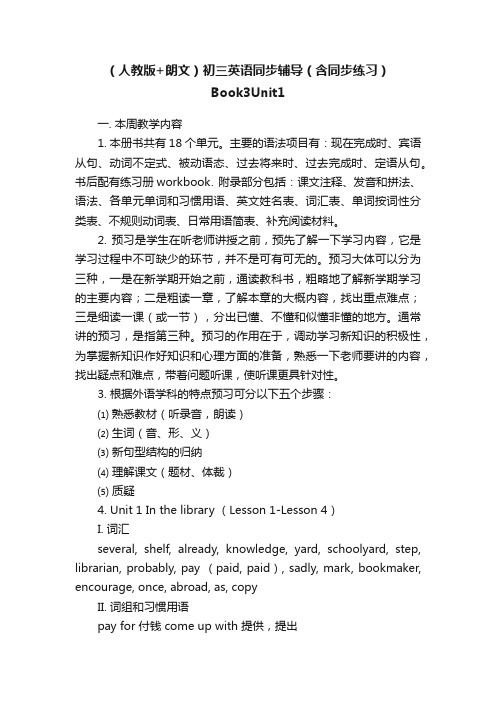
(人教版+朗文)初三英语同步辅导(含同步练习)Book3Unit1一. 本周教学内容1. 本册书共有18个单元。
主要的语法项目有:现在完成时、宾语从句、动词不定式、被动语态、过去将来时、过去完成时、定语从句。
书后配有练习册workbook. 附录部分包括:课文注释、发音和拼法、语法、各单元单词和习惯用语、英文姓名表、词汇表、单词按词性分类表、不规则动词表、日常用语简表、补充阅读材料。
2. 预习是学生在听老师讲授之前,预先了解一下学习内容,它是学习过程中不可缺少的环节,并不是可有可无的。
预习大体可以分为三种,一是在新学期开始之前,通读教科书,粗略地了解新学期学习的主要内容;二是粗读一章,了解本章的大概内容,找出重点难点;三是细读一课(或一节),分出已懂、不懂和似懂非懂的地方。
通常讲的预习,是指第三种。
预习的作用在于,调动学习新知识的积极性,为掌握新知识作好知识和心理方面的准备,熟悉一下老师要讲的内容,找出疑点和难点,带着问题听课,使听课更具针对性。
3. 根据外语学科的特点预习可分以下五个步骤:⑴ 熟悉教材(听录音,朗读)⑵ 生词(音、形、义)⑶ 新句型结构的归纳⑷ 理解课文(题材、体裁)⑸ 质疑4. Unit 1 In the library (Lesson 1-Lesson 4)I. 词汇several, shelf, already, knowledge, yard, schoolyard, step, librarian, probably, pay (paid, paid), sadly, mark, bookmaker, encourage, once, abroad, as, copyII. 词组和习惯用语pay for 付钱 come up with 提供,提出think of 认为,想起 pick up 拾起,捡起finish doing完成,做完 sooner or later迟早encourage sb. to do sth. 鼓励…做… fill in 填写,装满used to 过去常常 in the schoolyard 在校园里on the shelf在架子上III. 日常交际用语I have got a book.Excuse me. Have you got…? Yes, I have. / No, I haven’t.Have you ever traveled on a plane?Wait a minute.There he is.What kinds of books do you like reading?V. 语法现在完成时:由“助动词 have (has)+过去分词”构成。
(人教版+朗文)初三英语同步辅导(含同步练习)Unit 1-6 复习(语法部分)

(人教版+朗文)初三英语同步辅导(含同步练习)Unit 1-6 复习(语法部分)一.教学内容:(一)现在完成时(The Present Perfect Tense)1. 动作发生于一个非确定的过去的时间(过去的时间并不重要或根本不知道),但它的结果仍对现在有影响.I have read the letter, and I know what it is about.2. 动作发生在过去,目前仍在连续或刚刚结束,常和“for” 加上“一段时间”,或“since” 加上“一个准确的过去的时间”连用。
“for”用于过去的一段时间. (动词必需是可以连续的)He has been there for six months. 他去那有6个月了。
(直到现在)He has never been there. 他从来都没去过那里。
(直到现在)“since”用于过去的一个准确的时间,意思是“从那时始终到现在”,总是和完成时一齐用,而且不能省略。
(主句动词必需是可以连续的)since +一段时间+ago;since+一个时间点;since+从句。
如:He has stayed here since 3 hours ago.He has stayed here since 3 o’clock.Tim has been in Nantong since January.自从1月份以来Tim始终都在南通。
(现在仍在南通)留意:“since”后面的准确的过去的时间也可以是一个含有过去时的从句.He has been interested in collecting coins since he was a child.他打小时候起就对收集硬币感爱好。
(现在还是如此)He has taught English since he came here.现在完成时常和短语“up to now /till now”,“so far”(意思是从过去某一确定的时间始终连续到现在)连用。
(人教版+朗文)初三英语同步辅导...

(人教版+朗文)初三英语同步辅导(含同步练习)Unit 3Make our world more beautiful (Lesson 9-l2)一.教学内容I. 词汇pour, waste, dirty, member, join, environment, harm, rubbish, whenever, produce, wherever, litter, on to, public, spit, protect, tidy, dustbin, recycle, contribution, suppose, riddle, nearby II. 词组和习惯用be afraid of 害怕 a piece of music 一首乐曲protect the environment 保护环境 improve environment 改善环境as soon as 一…就… plant trees 种树base on 以…为根据 do well in 在…做得好all one’s life 一生III. 日常交际用语1. Where have you been?2. That’s terrible.3. How long have you been …?I’ve been here for / since…4. How many English words have you learnt since you came?5. We should plant more trees to make our city greener.6. The more trees the better.7. I’d like joining you.IV. 语法现在完成时的第三种用法,表示过去已经开始,持续到现在的动作或状态,可以和表示从过去某一时刻延续到现在(包括“现在”在内)的一段时间状语连用。
难点是这一用法的谓语动词应为延续性动词,for 短语和since 短语的转换。
(人教版+朗文)初三英语同步辅导(含同步练习)Unit 12 Mainly revision整理
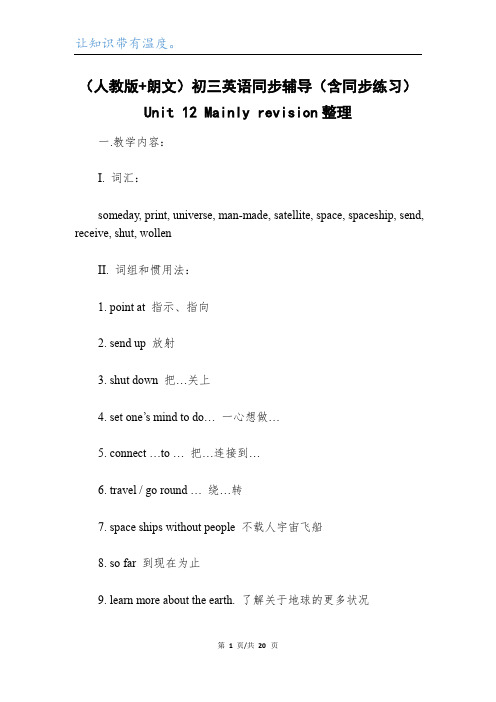
(人教版+朗文)初三英语同步辅导(含同步练习)Unit 12 Mainly revision整理一.教学内容:I. 词汇:someday, print, universe, man-made, satellite, space, spaceship, send, receive, shut, wollenII. 词组和惯用法:1. point at 指示、指向2. send up 放射3. shut down 把…关上4. set one’s mind to do… 一心想做…5. connect …to … 把…连接到…6. travel / go round … 绕…转7. space ships without people 不载人宇宙飞船8. so far 到现在为止9. learn more about the earth. 了解关于地球的更多状况10. with one’s help. / with the help of 在…关心下11. make telephone calls 打电话12. all the time 始终、总是13. put off 推迟、拖延III. 日常交际用语:A. 有关选择电视节目的用语。
What’s on tonight? 今晚放映什么节目?Which channel is it on?在哪个频道放映?It must be on channel 2.确定在2频道。
I can’t get anything on Channel 1.1频道什么也收不到。
B. 有关询问距离的用语。
How far away is Sydney from Beijing?Sydney is 10,400 kilometres away from Beijing.IV. 语法被动语态:一般现在时主语+is / are +动词过去分词一般过去时主语+was / were +动词过去分词含有情态动词主语+can, may, must should +be+动词过去分词现在完成时主语+have / has +been +动词过去分词重点与难点:1. mind用法(1)mind作名词“精神、智力、头脑、想法、意向、目的”等。
九年级英语Unit 1 Lesson 1-Lesson 4人教朗文版知识精讲
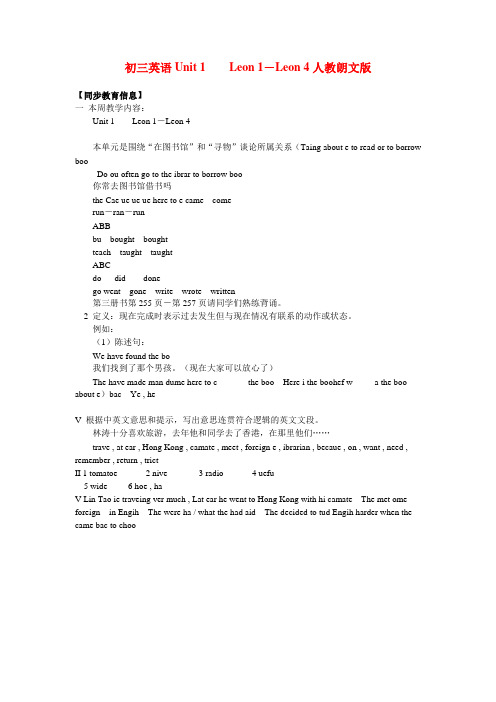
初三英语Unit 1 Leon 1-Leon 4人教朗文版【同步教育信息】一本周教学内容:Unit 1 Leon 1-Leon 4本单元是围绕“在图书馆”和“寻物”谈论所属关系(Taing about e to read or to borrow booDo ou often go to the ibrar to borrow boo你常去图书馆借书吗the Cae ue ue ue here to e came comerun-ran-runABBbu bought boughtteach taught taughtABCdo did donego went gone write wrote written第三册书第255页-第257页请同学们熟练背诵。
2 定义:现在完成时表示过去发生但与现在情况有联系的动作或状态。
例如:(1)陈述句:We have found the bo我们找到了那个男孩。
(现在大家可以放心了)The have made man dume here to c ______ the boo Here i the boohef w ____ a the boo about e)bac Ye , he _____V 根据中英文意思和提示,写出意思连贯符合逻辑的英文文段。
林涛十分喜欢旅游,去年他和同学去了香港,在那里他们……trave , at ear , Hong Kong , camate , meet , foreign e , ibrarian , becaue , on , want , need , remember , return , trictII 1 tomatoe 2 nive 3 radio 4 uefu5 wide6 hoe , haV Lin Tao ie traveing ver much , Lat ear he went to Hong Kong with hi camate The met ome foreign in Engih The were ha / what the had aid The decided to tud Engih harder when the came bac to choo。
(人教版+朗文)初三英语同步辅导(含同步练习)Unit14Shopping
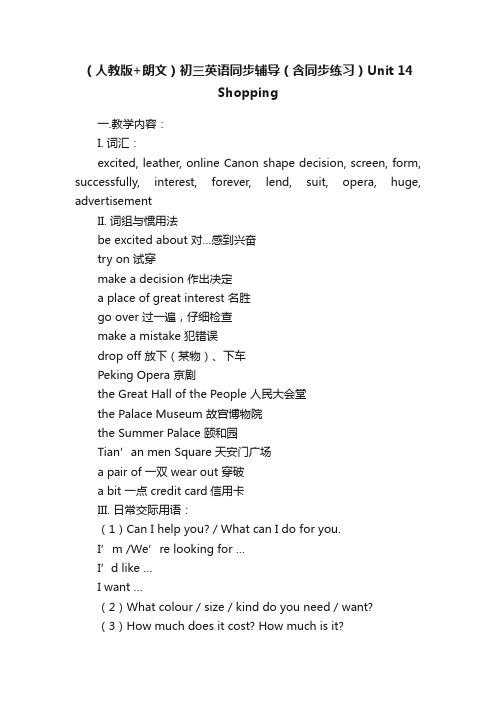
(人教版+朗文)初三英语同步辅导(含同步练习)Unit 14Shopping一.教学内容:I. 词汇:excited, leather, online Canon shape decision, screen, form, successfully, interest, forever, lend, suit, opera, huge, advertisementII. 词组与惯用法be excited about 对…感到兴奋try on 试穿make a decision 作出决定a place of great interest 名胜go over 过一遍,仔细检查make a mistake 犯错误drop off 放下(某物)、下车Peking Opera 京剧the Great Hall of the People 人民大会堂the Palace Museum 故宫博物院the Summer Palace 颐和园Tian’an men Square 天安门广场a pair of 一双 wear out 穿破a bit 一点 credit card信用卡III. 日常交际用语:(1)Can I help you? / What can I do for you.I’m /We’re looking for …I’d like …I want …(2)What colour / size / kind do you need / want?(3)How much does it cost? How much is it?How much do they cost? How much are they? (4)Have you got anything cheaper?(5)Could I have a look at it?(6)Could I try it on?You’d better try it on first.IV. 语法:(1)过去完成时 had+过去分词(2)由so …that 引导的状语从句重点与难点:1. be excited aboutA. excited 激动的、兴奋的、修饰人exciting 使人激动的,修饰物The excited people had already left when I got there. 当我到达那儿的时候,那些激动的人们已经离开。
(人教版+朗文)初三英语同步辅导(含同步练习)Unit 7 A man who never give
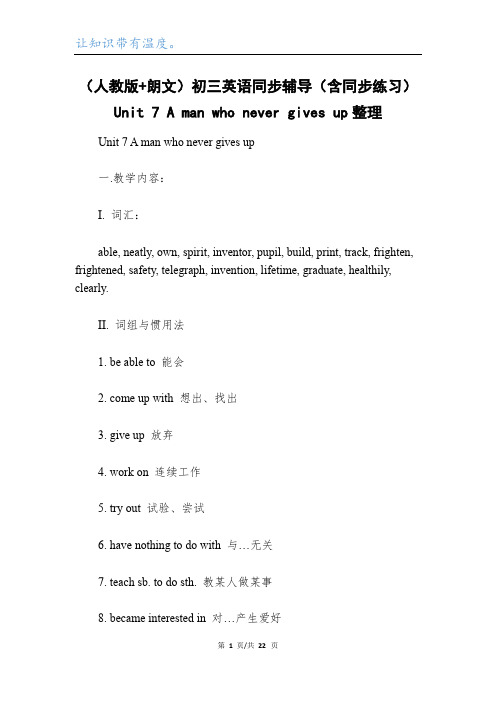
(人教版+朗文)初三英语同步辅导(含同步练习)Unit 7 A man who never gives up整理Unit 7 A man who never gives up一.教学内容:I. 词汇:able, neatly, own, spirit, inventor, pupil, build, print, track, frighten, frightened, safety, telegraph, invention, lifetime, graduate, healthily, clearly.II. 词组与惯用法1. be able to 能会2. come up with 想出、找出3. give up 放弃4. work on 连续工作5. try out 试验、尝试6. have nothing to do with 与…无关7. teach sb. to do sth. 教某人做某事8. became interested in 对…产生爱好9. at the age of 在…岁时10. start doing 开头做11. see sb. doing sth. 观察某人做某事12. rush out 冲出去13. so …that 如此…以致14. open up 开放15. think more of 看重、重视16. turn down 关小、调低17. tell / ask sb. to do sth. 告许某人做某事III. 日常交际用语:1. What’s wrong with it?2. It doesn’t matter.3. Which of these do you think is the most useful invention?4. Which of these would you most like to own?5. What kind of spirit do you need to become an inventor?6. No matter how hard it is, he never gives up.7. What do you want to do after you graduate from school?8. Don’t you think his radio is too noisy?9. I’m going to improve myself this year.10. Could you speak more clearly, please?IV. 语法:动词不定式做宾语、状语、宾语补足语。
(人教版+朗文)初三英语同步辅导(含同步练习)Unit 15 A doctor for animal

(人教版+朗文)初三英语同步辅导(含同步练习)Unit 15 A doctor for animals整理一.教学内容:I. 词汇grateful, tail, lonely, success, mostly, pig, education, countryside, treat, regard, exactly, keep, experience, painful, rock, story, grab, crash, mobile, leastII. 词组和惯用法:make up one’s mind 下决心before long 不久以后regard …as… 把…当作…as if 似乎at sea在大海上at all一点也不at least至少be busy with 忙于just as 在大海上be / feel lonely 孤独、孤独try to do sth 试着做某事III. 日常交际用语:Do you like being a doctor for animals?I really don’t have a favourite.A pet can help a person feel less lonely.A pet also gives people a lot of pleasure.I really love her.IV. 语法:动词不定式做主语:To take medicine on time is necessary. It’s necessary to take medicine on time. 重点与难点:1. success / succeed / successfulA. success n. “胜利”He had no success as a businessman.作为商人,他没有胜利。
She was a success in business.她事业很胜利。
九年级英语语法讲解人教版(朗文)知识精讲(doc文档)
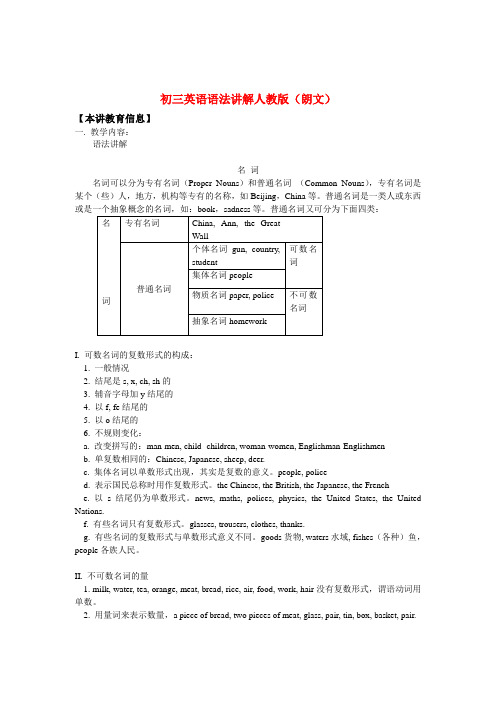
初三英语语法讲解人教版(朗文)【本讲教育信息】一. 教学内容:语法讲解名词名词可以分为专有名词(Proper Nouns)和普通名词(Common Nouns),专有名词是某个(些)人,地方,机构等专有的名称,如Beijing,China等。
普通名词是一类人或东西I. 可数名词的复数形式的构成:1. 一般情况2. 结尾是s, x, ch, sh的3. 辅音字母加y结尾的4. 以f, fe结尾的5. 以o结尾的6. 不规则变化:a. 改变拼写的:man-men, child- children, woman-women, Englishman-Englishmenb. 单复数相同的:Chinese, Japanese, sheep, deer.c. 集体名词以单数形式出现,其实是复数的意义。
people, policed. 表示国民总称时用作复数形式。
the Chinese, the British, the Japanese, the Frenche. 以s结尾仍为单数形式。
news, maths, polices, physics, the United States, the United Nations.f. 有些名词只有复数形式。
glasses, trousers, clothes, thanks.g. 有些名词的复数形式与单数形式意义不同。
goods货物, waters水域, fishes(各种)鱼,people各族人民。
II. 不可数名词的量1. milk, water, tea, orange, meat, bread, rice, air, food, work, hair没有复数形式,谓语动词用单数。
2. 用量词来表示数量,a piece of bread, two pieces of meat, glass, pair, tin, box, basket, pair.III. 名词的所有格冠词不定冠词a, an的用法泛指一类人或事物的一个或一类。
(人教版+朗文)初三英语同步辅导(含同步练习)Unit 9 What is it made of
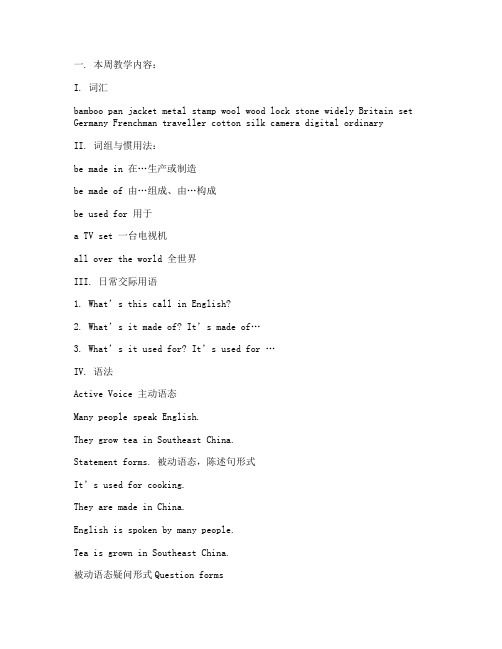
一. 本周教学内容:I. 词汇bamboo pan jacket metal stamp wool wood lock stone widely Britain set Germany Frenchman traveller cotton silk camera digital ordinaryII. 词组与惯用法:be made in 在…生产或制造be made of 由…组成、由…构成be used for 用于a TV set 一台电视机all over the world 全世界III. 日常交际用语1. What’s this call in English?2. What’s it made of? It’s made of…3. What’s it used for? It’s used for …IV. 语法Active Voice 主动语态Many people speak English.They grow tea in Southeast China.Statement forms. 被动语态,陈述句形式It’s used for cooking.They are made in China.English is spoken by many people.Tea is grown in Southeast China.被动语态疑问形式Question formsIs it produced in China?Is it used for cooking?二. 重点和难点1. 分数的表达分数的基本构成:分子为基数词分母为序数词,分子大于1时,分母的序数词应用复数形式。
one-fourth (one quarter)three-fourths(three quarters)two - fifths2. information 动词inforn+后缀tion.operate-operation(手术)invent-invention(发明)contribute-contribution(贡献)decorate-decoration(装饰)discuss-discussion(讨论)educate-education(教育)pollute-pollution(污染)pronounce-pronunciation(发音)compete-competition(比赛)describe-description(描写)graduate-graduation(毕业)realize-realization(认识)3. try的用法:(1)try试一试have a try Can I have a try?(2)try审问、宣判Which judge has tried the case.哪位法官审理过这个案子?(3)try与一些词构成的短语A. try one’s best = do one’s bestI tried my best to find the answer. =I did my best to find the answer.B. try on 试穿May I try it on?C. try out 试验、试用Edison was always asking questions and try out new ideas.4. be able to / can(1)can只有现在式和过去式,因此当表示将来或完成意义时,要用be able to 的将来时态或完成时态。
同步测评解析英语(人教九年级上)Unit9 SectionB(1a-1d)
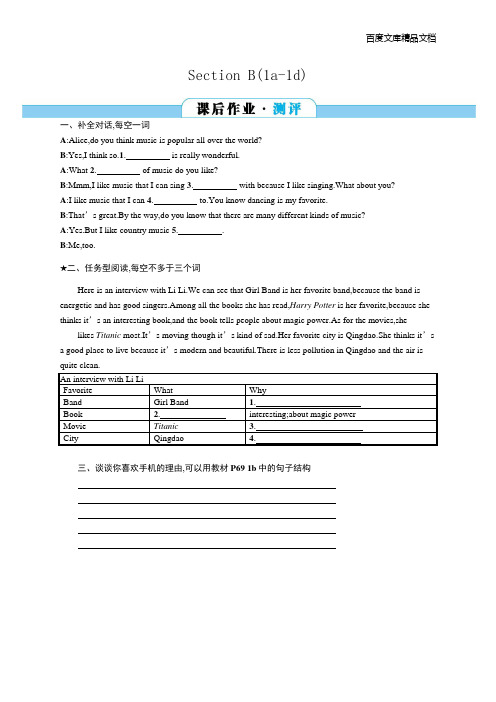
Section B(1a-1d)一、补全对话,每空一词A:Alice,do you think music is popular all over the world?B:Yes,I think so.1. is really wonderful.A:What 2. of music do you like?B:Mmm,I like music that I can sing 3. with because I like singing.What about you?A:I like music that I can 4. to.You know dancing is my favorite.B:That’s great.By the way,do you know that there are many different kinds of music?A:Yes.But I like country music 5..B:Me,too.★二、任务型阅读,每空不多于三个词Here is an interview with Li Li.We can see that Girl Band is her favorite band,because the band is energetic and has good singers.Among all the books she has read,Harry Potter is her favorite,because she thinks it’s an interesting book,and the book tells people about magic power.As for the movies,she likes Titanic most.It’s moving though it’s kind of sad.Her favorite city is Qingdao.She thinks it’s a good place to live because it’s modern and beautiful.There is less pollution in Qingdao and the air is quite clean.An interview with Li LiFavorite What WhyBand Girl Band1.Book2.interesting;about magic powerMovie Titanic3.City Qingdao4.三、谈谈你喜欢手机的理由,可以用教材P691b中的句子结构答案与解析一、1.Music2.kind3.along4.dance5.best二、1.energetic;good singers2.Harry Potter3.sad but moving4.modern;beautiful;clean三、略。
(人教版+朗文)初三英语同步辅导...
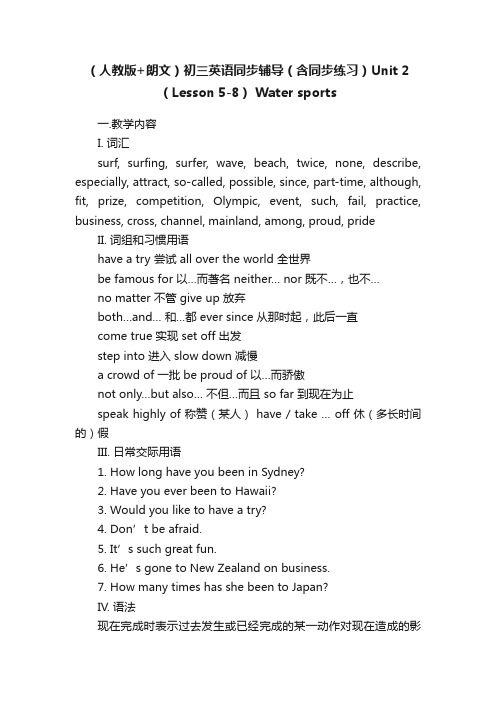
(人教版+朗文)初三英语同步辅导(含同步练习)Unit 2(Lesson 5-8) Water sports一.教学内容I. 词汇surf, surfing, surfer, wave, beach, twice, none, describe, especially, attract, so-called, possible, since, part-time, although, fit, prize, competition, Olympic, event, such, fail, practice, business, cross, channel, mainland, among, proud, pride II. 词组和习惯用语have a try 尝试 all over the world 全世界be famous for 以…而著名neither… nor 既不…,也不…no matter 不管 give up 放弃bo th…and… 和…都 ever since 从那时起,此后一直come true 实现 set off 出发step into 进入 slow down 减慢a crowd of 一批 be proud of 以…而骄傲not only…but also… 不但…而且 so far 到现在为止speak highly of 称赞(某人)have / take … off 休(多长时间的)假III. 日常交际用语1. How long have you been in Sydney?2. Have you ever been to Hawaii?3. Would you like to have a try?4. Don’t be afraid.5. It’s such great fun.6. He’s gone to New Zealand on business.7. How many times has she been to Japan?IV. 语法现在完成时表示过去发生或已经完成的某一动作对现在造成的影响或结果,常与 already, just, yet, ever, never等连用。
(人教+朗文)九年级英语同步辅导与练习:Unit16Thefootballmatch

(人教+朗文)九年级英语同步辅导与练习:Unit16ThefootballmatchUnit 16 The football matchI. 词汇:beat, goal, check-out, realize, train, training, captain, deserve, confident, striker, midfield, excellent, shot, nervous, lazy, final, amazing, performance, teamwork, basketball, boring, spill, rule against, expect, roughII. 词组:by the time 到…的时候midfield player中场球员carry on 坚持下去,继续下去be pleased with 对…感到满意never mind 没有关系from now on 从现在起,今后think of 认为by the time 到…时候receive a letter from 收到…的来信play against 与…比赛expect to do …期望、预计be against 与…对抗III. 交际用语:I have never seen such an exciting match before.They beat us 5-3The boys are too confident.Never mind.It’s a boring. / great match!It was the happiest day of my life.IV. 语法:过去完成时二. 重点、难点:1. beat sb (in, at)sth.He beat me at chess.I can beat you at swimming注win后接game, war, match, competion等We won the match easily2. He said he had seen him.过去完成时态:表示一个动作发生在过去某一时间之前或某一动作之前,即过去的过去。
(人教版+朗文)初三英语同步辅导(含同步练习)Unit4Travel(Lesson13-16)
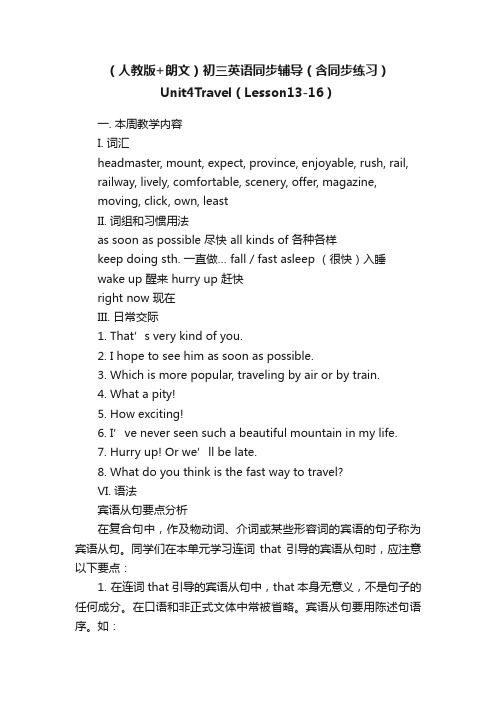
(人教版+朗文)初三英语同步辅导(含同步练习)Unit4Travel(Lesson13-16)一. 本周教学内容I. 词汇headmaster, mount, expect, province, enjoyable, rush, rail, railway, lively, comfortable, scenery, offer, magazine,moving, click, own, leastII. 词组和习惯用法as soon as possible 尽快 all kinds of 各种各样keep doing sth. 一直做… fall / fast asleep (很快)入睡wake up 醒来 hurry up 赶快right now 现在III. 日常交际1. That’s very kind of you.2. I hope to see him as soon as possible.3. Which is more popular, traveling by air or by train.4. What a pity!5. How exciting!6. I’ve never seen such a beautiful mountain in my life.7. Hurry up! Or we’ll be late.8. What do you think is the fast way to travel?VI. 语法宾语从句要点分析在复合句中,作及物动词、介词或某些形容词的宾语的句子称为宾语从句。
同学们在本单元学习连词that引导的宾语从句时,应注意以下要点:1. 在连词that引导的宾语从句中,that本身无意义,不是句子的任何成分。
在口语和非正式文体中常被省略。
宾语从句要用陈述句语序。
如:She says (that)she will leave a message on the headmaster’s desk.她说她将在校长的桌子放个留言条。
(人教版+朗文)初三英语同步辅导(含同步练习)Unit6Mainlyrevision
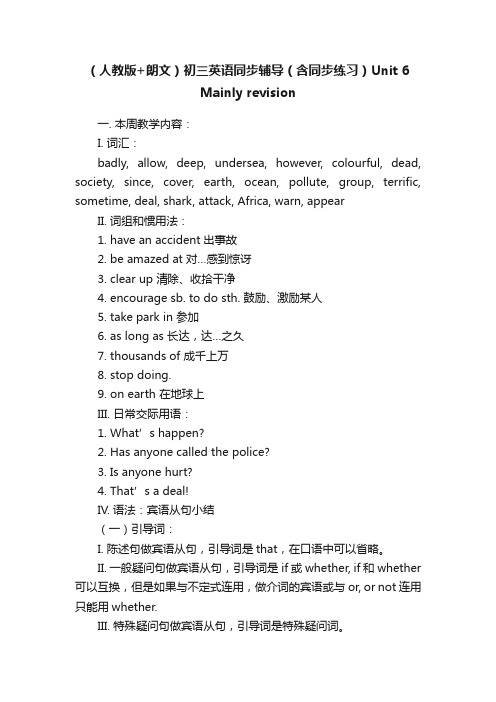
(人教版+朗文)初三英语同步辅导(含同步练习)Unit 6Mainly revision一. 本周教学内容:I. 词汇:badly, allow, deep, undersea, however, colourful, dead, society, since, cover, earth, ocean, pollute, group, terrific, sometime, deal, shark, attack, Africa, warn, appearII. 词组和惯用法:1. have an accident出事故2. be amazed at 对…感到惊讶3. clear up 清除、收拾干净4. encourage sb. to do sth. 鼓励、激励某人5. take park in 参加6. as long as 长达,达…之久7. thousands of 成千上万8. stop doing.9. on earth 在地球上III. 日常交际用语:1. What’s happen?2. Has anyone called the police?3. Is anyone hurt?4. That’s a deal!IV. 语法:宾语从句小结(一)引导词:I. 陈述句做宾语从句,引导词是that,在口语中可以省略。
II. 一般疑问句做宾语从句,引导词是if或whether, if 和whether 可以互换,但是如果与不定式连用,做介词的宾语或与or, or not 连用只能用whether.III. 特殊疑问句做宾语从句,引导词是特殊疑问词。
(二)语序一般疑问句、特殊疑问句做宾语从句,用陈述句语序。
(三)时态:I. 主句的谓语动词如果是现在时态,宾语从句中动词可以根据实际情况用不同的时态。
II. 主句的谓语动词是一般过去时,宾语从句必须使用过去相应的时态。
如果宾语从句表示客观真理,即使主句中用了过去时,从句的谓语动词要用一般现在时。
九年级英语Unit 1 Lesson 1-Lesson 4人教版+朗文知识精讲
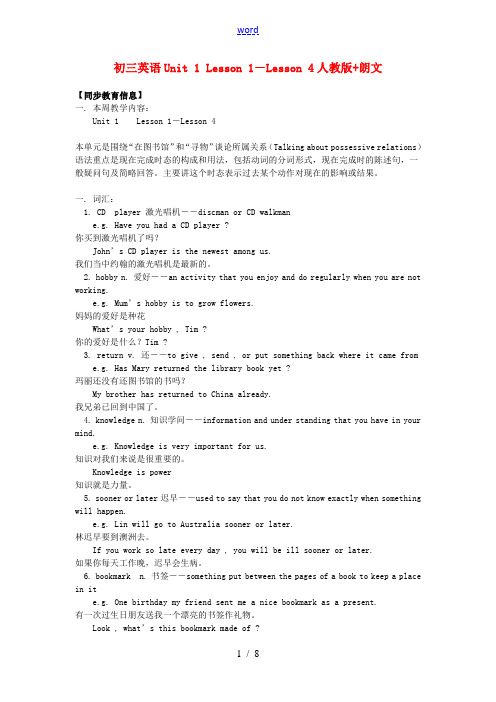
初三英语Unit 1 Lesson 1-Lesson 4人教版+朗文【同步教育信息】一. 本周教学内容:Unit 1 Lesson 1-Lesson 4本单元是围绕“在图书馆”和“寻物”谈论所属关系(Talking about possessive relations)语法重点是现在完成时态的构成和用法,包括动词的分词形式,现在完成时的陈述句,一般疑问句及简略回答。
主要讲这个时态表示过去某个动作对现在的影响或结果。
一. 词汇:1. CD player 激光唱机--discman or CD walkmane.g. Have you had a CD player ?你买到激光唱机了吗?John’s CD player is the newest among us.我们当中约翰的激光唱机是最新的。
2. hobby n. 爱好--an activity that you enjoy and do regularly when you are not working.e.g. Mum’s hobby is to grow flow ers.妈妈的爱好是种花What’s your hobby , Tim ?你的爱好是什么?Tim ?3. return v. 还--to give , send , or put something back where it came frome.g. Has Mary returned the library book yet ?玛丽还没有还图书馆的书吗?My brother has returned to China already.我兄弟已回到中国了。
4. knowledge n. 知识学问--information and under standing that you have in your mind.e.g. Knowledge is very important for us.知识对我们来说是很重要的。
- 1、下载文档前请自行甄别文档内容的完整性,平台不提供额外的编辑、内容补充、找答案等附加服务。
- 2、"仅部分预览"的文档,不可在线预览部分如存在完整性等问题,可反馈申请退款(可完整预览的文档不适用该条件!)。
- 3、如文档侵犯您的权益,请联系客服反馈,我们会尽快为您处理(人工客服工作时间:9:00-18:30)。
目录Unit 1 In the library (3)Part 1 (3)Part 2 (5)中考链接 (6)单元检测 (7)Unit 2Water sports (8)Part 1 (8)Part 2 (10)中考链接 (12)单元检测 (13)Unit 3 Make our world more beautiful (14)Part 1 (14)Part 2 (16)中考链接 (18)单元检测 (19)Unit 4 Travel (21)Part 1 (21)Part 2 (24)中考链接 (26)单元检测 (27)Unit 5 have a good time (28)Part 1 (28)Part 2 (30)中考链接 (31)单元检测 (32)Unit 6 Mainly revision (34)中考链接 (37)单元检测 (38)Unit 7 A man who never gives up (39)Part 1 (39)Part 2 (41)中考链接 (45)单元检测 (46)Unit 8 Merry Christmas (47)Part 1 (47)Part 2 (49)中考链接 (52)单元检测 (53)Unit 9 What is made of? (54)Part 1 (54)Part 2 (56)中考链接 (59)单元检测 (60)Unit 10 When was it built? (61)Part 1 (61)Part 2 (63)中考链接 (65)单元检测 (66)Unit 11 Planting trees (68)Part 1 (68)Part 2 (71)中考链接 (73)单元检测 (74)Unit 12 Mainly revision (75)中考链接 (80)单元检测 (80)期中测试 (81)期末测试 (82)参考答案 (84)Unit 1 In the library单元目标1.学习现在完成时态的构成以及与现在的关系和对时间状语的要求,以及现在完成时的陈述句形式和疑问句形式及其简略答语是本单元的教学重点。
要求学生能初步运用现在完成时态谈论一些过去发生的动作对现在造成的影响,掌握过去分词的构成。
2.能够熟练运用本单元有关“借物、寻物”的交际用语,正确运用Have you got…?和Do you have…?及其简略答语。
3.掌握本单元的单词和短语,特别是used to,pay for,think of等用法。
4.利用阅读课文来培养学生的阅读理解能力和根据上下文判断生词词义的能力,并逐步提高对学生阅读速度的要求。
5.要求学生能用自己组织的语言,对课文故事予以简述。
Part 1要点精讲1. used to⑴used to 过去经常He used to swim in winter.Jack used to be an English teacher.used to的疑问形式和否定形式可以用助词did或自身形式构成。
美国人多用助动词 did;英国人多用used to本身。
–Did you use to go there?–Yes, very often. / No, only seldom.Used she to be a Chinese teacher? Yes, she used.= Did she used to be a Chinese teacher? Yes, she did.He didn‘t used to smoke.= He used not to smoke.⑵be used to sth. /doing sth. 习惯于做某事My grandmother is used to getting up early.He is used to running in the morning.⑶be used to do sth. 被用来做某事A thermos is used to keep hot water.2.Her hobby is to read. 她的业余爱好是读书。
to read 是一个动词不定式,在句中用作表语。
如:Her wish is to be a singer. 她的愿望是成为一个歌手。
She sings a lot every day.3.pay for意为“给……报酬”,“付款”。
常见句型有:(1) pay for+货物,(2) pay+名词/代词+for+物。
例如:How much did you pay for that book?20 yuanI’ll pay you five yuan for it.我将为此给你五元钱。
I’m afraid I can’t pay you anything for it.我恐怕不能为此给你任何报酬。
e up with= find or produce (an answer)意为“提出,提供”,它是由动词和介词一起构成的短语动词。
它的另一个意思是“赶上”。
例如:I hope you can come up with a better plan than this. 我希望你能提出个更好的计划。
5.the lost books lost=missing丢失的。
英语中单个分词(包括现在分词和过去分词)也能作定语用,它们一般放在名词的前面。
又如:a stolen car一辆失窃的汽车;a broken wind。
一扇破的窗。
现在完成时一.现在完成时的构成1.现在完成时的基本句式是have/has+过去分词。
例如:I have seen that film.我看过那部电影。
We have just finished our homework.我们刚刚做完家庭作业。
She has gone home.她回家去了。
注意:该句式中的have或has是助动词,has用于第三人称单数,其他人称一律用have。
该句式中have/has和过去分词之间可插入just,译成汉语时,往往用“已经”、“刚刚”、“过”或“了”等这类词。
2.现在完成时的一般疑问句式是把助动词have或has提到主语之前。
例如:Have you read this book yet?你读过这本书吗?Has he eaten that apple yet?他吃了那个苹果了吗?注意:现在完成时的一般疑问句往往在句末加yet。
把现在完成时的一般疑问句译成汉语时,往往表示“……过吗?”“还没有……吗?”等。
其肯定回答用Yes,主语+ have/has。
否定回答用No,主语+haven’t/hasn’t.有时用No,not yet.或No,never.3.现在完成时的否定句式是have/has not +过去分词。
例如:We haven’t studied Book III yet.我们还没有学过第三册课本。
The car hasn’t stopped yet.汽车还没有停下来。
注意:现在完成时的否定句往往也在句末加yet;译成汉语时表示“还没有……”之意。
二.现在完成时的用法表示过去发生或完成的某一动作对现在造成的影响或结果。
Have you read that story?你读过那个故事吗?(“读”这一动作发生在过去,对现在造成的影响为:是否知道故事的内容。
)I have bough two apples.我买了两个苹果。
(“买”这一动作发生在过去,对现在造成的结果是:拥有两个苹果。
)在学习这一概念的同时,还应注意与现在完成时态连用的几个副词:already;just,yet,ever,never等。
already,just多用于肯定句,yet,ever,never多用于疑问句和否定句中。
如:I have already finished my homework.我已经完成了作业。
He has just had his meal. 他刚吃过饭。
Have you ever heard this song?你曾听过这首歌吗?They haven’t left yet.他们还没动身。
We have never seen so beautiful flowers.我们从来没有见过这么漂亮的花。
典型例题【例1】She‘s never looked after a baby before,_______ she?A isn‘tB hasn‘t C. has D is【答案】C【解析】因为主句表示否定的意思,所以反意疑问句用肯定的形式,又因为前面是完成时,所以用has【例2】His birth makes his family _________.A happilyB happyC happierD happiest【答案】B【解析】Make sb +adj使某人怎么样针对训练1. Have you ______ him before?A. sawB. seeC. to seeD. seen()2. Have you ______ spoken to an Englishman?A. neverB. alwaysC. everD. often()3. They bought a new TV set a week ______.A. agoB. beforeC. frontD. in front()4. --How long ______ it ______ you to get home last night? --Half an hour.A. did, payB. did, takeC. did costD. did, spend()5. --John likes riding in the open air. --______.A. So does TimB. Also does TimC. Tim likes alsoD. So Tim doesPart 2要点精讲1. fill⑴fill…with把……填满Please fill the bags with rice. We've got to take them to the poor family in the village.fill也可以表示状态。
相当于be filled withSmoke filled the room. = The room was filled with smoke.⑵fill in填入、填写、塞满--Please fill in your telephone number and your name.--OK, But may I borrow your pen?--What shall I do if I want to find a job here?--Fill in the form first.2.pay for意为“给……报酬”,“付款”。
